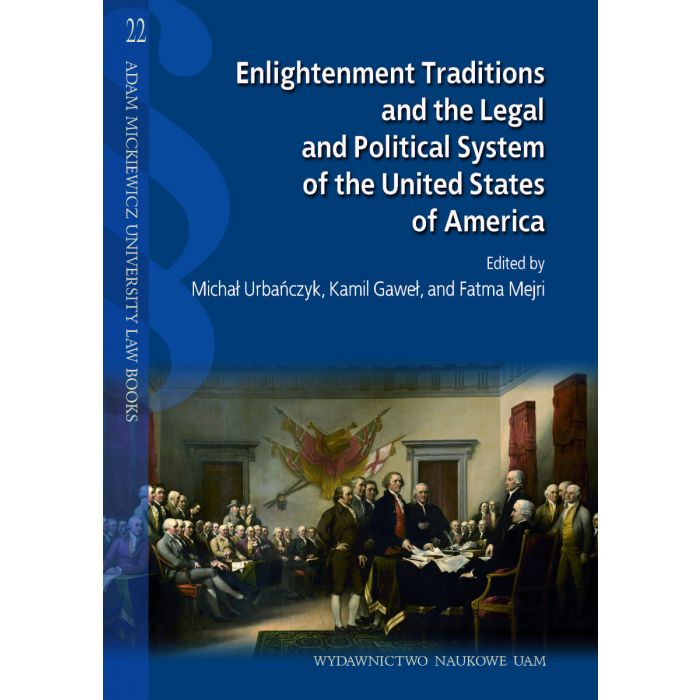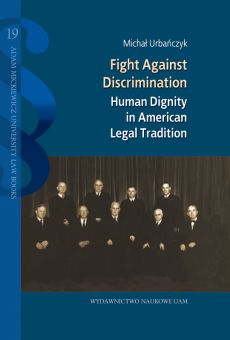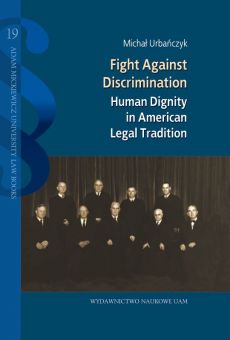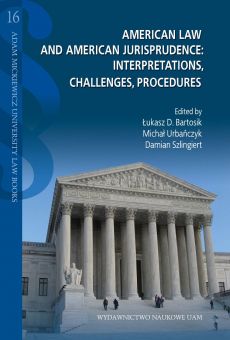Enlightenment Traditions and the Legal and Political System of the United States of America
- Dostępność: brak w magazynie
- ISBN: 978-83-232-4254-3 (PDF)
- DOI: 10.14746/amup.9788323242543
- Kategoria: Otwarty dostęp, Prawo, Ebooki, Adam Mickiewicz University Law Books
- Data wydania: 2024


Autorzy Enlightenment Traditions and the Legal and Political System of the United States of America zapraszają czytelników w wyjątkową podróż, która zapozna ich zarówno z amerykańskimi ideami politycznymi wyrosłymi na gruncie oświecenia, jak i ze współczesnymi wyzwaniami prawnymi, przed którymi staje najstarsza nowożytna republika i demokracja liberalna. Lektura książki pozwoli przyjrzeć się m.in. kontrowersyjnemu wyrokowi Sądu Najwyższego w sprawie aborcji, kryzysowi migracyjnemu na granicy z Meksykiem, problemom systemu edukacji prawniczej, amerykańskiej praktyce wykonywania kary śmierci, proceduralnym wyzwaniom pojawiającym się w trakcie uchwalania federalnego budżetu czy filozoficznym fundamentom rewolucji amerykańskiej.
XXI-wieczne Stany Zjednoczone Ameryki są nieodrodnym dzieckiem filozofii i tradycji oświeceniowych, a jednocześnie – efektem prawie 250-letniej ewolucji i funkcjonowania systemu polityczno-prawnego. Amerykański ustrój, prawo i myśl polityczna rozwijały się bowiem od końca XVII wieku i dziś stanowią fundament porządku euroatlantyckiego. Dlatego też namysł nad nimi stanowi niezwykle interesujące i pożyteczne zadanie.
Celem publikacji jest jednak opisanie nie tylko koncepcji zrodzonych w XVIII wieku, lecz także wybranych współczesnych instytucji i regulacji prawnych, które stanowią efekt tej ewolucji. Książka została podzielona na trzy części, w których Autorzy omawiają wybrane idee polityczne, charakteryzują elementy ustroju i systemu politycznego oraz przedstawiają opinie na temat kluczowych praw i wolności obywatelskich.
Preface
Notes on the Contributors
Introduction: Enlightenment Roots of American Law Michał Urbańczyk, Kamil Gaweł, and Fatma Mejri
Part I
IDEAS AND INTERPRETATIONS
CHAPTER 1
Three Pillars of the American Founding Marcin Gajek
Introduction
Protestantism
The “Whig Science of Politics”
Republicanism
Conclusions
CHAPTER 2
Who Are You, Mr. Adams? Tomasz Tulejski
Introduction
Human Nature
Aristocracy and the People
Democracy
The Balance of Power
Liberty and Property
Conclusions
CHAPTER 3
“Enlightenment Democracy”: Tara Ross’ Reflections on the Origins and Functioning of the Electoral College of the United States of America Kamil Gaweł
Introduction
The Origins of the Electoral College, According to Tara Ross
An Enlightenment Solution in the Twenty-First Century
Conclusions
CHAPTER 4
The Institution of the Jury in the Works of the Founding Fathers on the Federal Constitution Wojciech Kwiatkowski
Introduction
The Jury in the British Colonies in North America
The Jury and the War of Independence
The Jury in the Drafts of the Federal Constitution
The Drafting and Adoption of the Bill of Rights by the States
Fifth Amendment to the Constitution
Sixth Amendment to the Constitution
Seventh Amendment to the Constitution
Conclusions
Part II
LEGAL AND POLITICAL SYSTEM AND ITS CONSEQUENCES
CHAPTER 5
The Federal Budget Process in the United States of America, or the Battlefield between the President and Congress Przemysław Pest
Introduction
The Origins of the Federal Budget Process and the Presidential Budget Proposal
The Budget Process in Congress
The Presidential Veto and Impoundment
Conclusions
CHAPTER 6
Constitutional Background and the Practice of Impeachment in the United States Mateusz Radajewski
Introduction
The Origins of Impeachment in the US Political System
Impeachment in the US System: General Remarks
Subjects Liable under Impeachment
Objective Scope of Liability under Impeachment
Proceedings before Congress
The Institution of Impeachment in Practice
Conclusions
CHAPTER 7
The Origins of Congressional Oversight Maciej Turek
Introduction
American Founding and the Congressional Oversight
St. Clair Defeat
Conclusions
CHAPTER 8
Judicial Power in the American System, with Particular Emphasis on the Impeachment Procedure Izabela Dorywała-Kosmalska and Julia Pietrasiewicz
Introduction
Impeachment: A Tool of Accountability
High Crimes and Misdemeanors
Examining Judicial Accountability Mechanisms: From Recall to Impeachment
Landmark Impeachment Cases in United States History
Conclusions
Part III
LIBERTIES, RIGHTS, AND PROCEDURES
CHAPTER 9
Rights Tomasz Raburski
Introduction
Colonial Era
American Constitution
Nineteenth-Century Developments
Hohfeldian Analysis
Twentieth Century
Conclusions
CHAPTER 10
The Flores Settlement Agreement and the Evolution of the Rights of Unaccompanied Migrant Minors in the US Anna Bartnik
Introduction
The Battle Over Jenny Flores Case
From the US Supreme Court Holding to the Flores Settlement Agreement
New Century, New Challenges, Old Issues
Conclusions
CHAPTER 11
Student Loans, Politics, and the Crisis of Legal Education in the United States Izabela Kraśnicka and Patryk Topolski
Introduction
Financing Higher Education in the USA
Financing Legal Education in the USA
Impact of Student Loans on Legal Education in the United States
Student Loans and Current Politics
Conclusions
CHAPTER 12
A Few Musings on the Dobbs v. Jackson Women’s Health Organization Case Anna Demenko
Introduction
From Roe to Dobbs: The Court’s Argumentation
Roe v. Dobbs: Which Is More Compelling?
Feminist v. Traditional Methods of Argumentation
The Decision of the Constitutional Tribunal of October 22, 2020: The Polish
Perspective
Conclusions
CHAPTER 13
Freedom of Testamentary Disposition in American Law from the Comparative Perspective Wojciech Bańczyk
Introduction
General Position of American Law on Freedom of Testamentary Disposition
Instruments of American Law That May Restrict Freedom of Testamentary Disposition
The Usefulness of Comparative Research on American Freedom of Disposition
Conclusions
CHAPTER 14
Human Dignity, the Eighth Amendment, and the Death Penalty Michał Urbańczyk
Introduction
Human Dignity as a Value That Defines the Essence of Cruel and Unusual Punishment
Furman v. Georgia
Gregg v. Georgia
Evolution of the Sentencing and Application of the Death Penalty in the Late Twentieth and Early Twenty-First Centuries
Conclusions
The authors of Enlightenment Traditions and the Legal and Political System of the United States of America invite readers on a unique journey that will acquaint them with American political ideas born out of the Enlightenment, as well as contemporary legal challenges faced by the oldest modern republic and liberal democracy. Throughout the reading, one can familiarize themselves with various subjects, including the controversial Supreme Court ruling on abortion, the migration crisis at the Mexican border, issues within the legal education system, the American practice of carrying out the death penalty, procedural challenges encountered during the enactment of the federal budget, and the philosophical foundations of the American Revolution.
The United States of America in the 21st century remains a true progeny of Enlightenment philosophy and tradition, as well as the result of nearly 250 years of evolution and operation of its political and legal system. American governance, law, and political thought have developed since the end of the 17th century and today form the foundation of the Euro-Atlantic order. Therefore, reflecting on it constitutes an exceptionally interesting and beneficial task. However, the goal of the publication is not only to describe concepts born in the 18th century but also to address selected contemporary institutions and legal regulations that are the outcome of this evolution. The book is divided into three parts, in which the authors discuss selected political ideas, characterize chosen elements of the governance and political system, and present opinions on key civil rights and liberties.
Introduction: Enlightenment Roots of American Law
Michał Urbańczyk, Kamil Gaweł, and Fatma Mejri
DOI: 10.14746/amup.9788323242543.1
CHAPTER 1
Three Pillars of the American Founding
Marcin Gajek
DOI: 10.14746/amup.9788323242543.2
CHAPTER 2
Who Are You, Mr. Adams?
Tomasz Tulejski
DOI: 10.14746/amup.9788323242543.3
CHAPTER 3
“Enlightenment Democracy”: Tara Ross’ Reflections on the Origins and Functioning of the Electoral College of the United States of America
Kamil Gaweł
DOI: 10.14746/amup.9788323242543.4
CHAPTER 4
The Institution of the Jury in the Works of the Founding Fathers on the Federal Constitution
Wojciech Kwiatkowski
DOI: 10.14746/amup.9788323242543.5
CHAPTER 5
The Federal Budget Process in the United States of America, or the Battlefield between the President and Congress
Przemysław Pest
DOI: 10.14746/amup.9788323242543.6
CHAPTER 6
Constitutional Background and the Practice of Impeachment in the United States
Mateusz Radajewski
DOI: 10.14746/amup.9788323242543.7
CHAPTER 7
The Origins of Congressional Oversight
Maciej Turek
DOI: 10.14746/amup.9788323242543.8
CHAPTER 8
Judicial Power in the American System, with Particular Emphasis on the Impeachment Procedure
Izabela Dorywała-Kosmalska and Julia Pietrasiewicz
DOI: 10.14746/amup.9788323242543.9
CHAPTER 9
Rights
Tomasz Raburski
DOI: 10.14746/amup.9788323242543.10
CHAPTER 10
The Flores Settlement Agreement and the Evolution of the Rights of Unaccompanied Migrant Minors in the US
Anna Bartnik
DOI: 10.14746/amup.9788323242543.11
CHAPTER 11
Student Loans, Politics, and the Crisis of Legal Education in the United States
Izabela Kraśnicka and Patryk Topolski
DOI: 10.14746/amup.9788323242543.12
CHAPTER 12
A Few Musings on the Dobbs v. Jackson Women’s Health Organization Case
Anna Demenko
DOI: 10.14746/amup.9788323242543.13
CHAPTER 13
Freedom of Testamentary Disposition in American Law from the Comparative Perspective
Wojciech Bańczyk
DOI: 10.14746/amup.9788323242543.14
CHAPTER 14
Human Dignity, the Eighth Amendment, and the Death Penalty
Michał Urbańczyk
DOI: 10.14746/amup.9788323242543.15
| Informacje szczegółowe | |
|---|---|
| Introduction |
Pobierz plik

|
| Contents |
Pobierz plik

|
|
|
|
| Wersja publikacji | e-book, otwarty dostęp |
| Język | angielski |
| Typ publikacji | Monografia |
| Wydanie | I |
| Seria | Law Books 22 |
| ISBN | 978-83-232-4254-3 (PDF) |
| DOI | 10.14746/amup.9788323242543 |
| Liczba stron | 290 |
| Liczba arkuszy wydawniczych | 19,00 |




